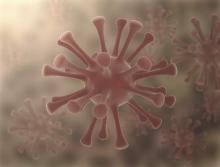SAN FRANCISCO – Once-daily treatment with fixed-dose combination sofosbuvir/velpatasvir for 12 weeks was well tolerated and resulted in high sustained virologic response rates in hepatitis C–infected patients in the phase III ASTRAL-1 study.
Of 740 patients with genotype 1, 2, 4, 5, or 6 hepatitis C virus (HCV) infection, with or without cirrhosis, who were enrolled at 81 sites in North America, Europe, or Hong Kong, 624 were randomized to receive active treatment with 400 mg of sofosbuvir (SOF) and 100 mg of velpatasvir (VEL) daily for 12 weeks, and 116 received placebo.
Of the patients in the SOF/VEL group, 53% had genotype 1 disease, 17% had genotype 2, 19% had genotype 4, 6% had genotype 5, and 7% had genotype 6; all genotype 5 patients were in the treatment group, and genotype 3 patients are being evaluated in a separate study, Dr. Jordan J. Feld reported at the annual meeting of the American Association for the Study of Liver Diseases.
The overall sustained virologic response at 12 or more weeks after treatment (SVR12) among treated patients was 99%, thus the study met the prespecified primary efficacy endpoint of 85% SVR12, said Dr. Feld of Toronto Western Hospital Liver Centre, Ontario.
The SVR12 was 98.5% and 97.1% in patients with genotypes 1 and 5, respectively, and 100% in those with genotypes 2, 4, and 6, respectively. The percentage of patients with cirrhosis in those with genotypes 1, 2, 4, 5, and 6 was 22.3%, 9.6%, 23.3%, 14.3%, and 14.6%, respectively (19.4% overall).
Two patients, both with genotype 1 infection (0.6% of genotype 1 patients), experienced virologic relapse. One had genotype 1b infection and was a treatment-experienced patient with cirrhosis, and 1 was a genotype 1a treatment-naive patient without cirrhosis.
None of the other patients, including 48 with cirrhosis, experienced virologic failure, but 4 were considered to have not achieved SVR12 for nonvirologic reasons, including loss to follow-up.
Overall, the type, frequency, and severity of adverse events and laboratory abnormalities were similar in the treatment and placebo group patients, Dr. Feld said, noting that severe adverse events occurred in 15 (2.4%) of the treatment group patients, and in none of the placebo-treated patients, but none of the severe adverse events were considered to be related to the study drug combination.
SOF/VEL combination therapy is an all-oral single tablet regimen shown in phase II studies to result in high SVR12 in patients with genotype 1-6 HCV. Those findings were confirmed in this phase III, placebo-controlled, double-blind study involving both treatment-naive and treatment-experienced genotype 1, 2, 4, 5, and 6 HCV patients with and without cirrhosis.
The current findings demonstrate that the regimen is “simple, safe, and highly effective,” Dr. Feld concluded.
Gilead Sciences sponsored ASTRAL-1. Dr. Feld disclosed ties with Merck, Janssen, Gilead, AbbVie, Theravance, Bristol-Myers Squibb, and Boehringer Ingelheim.


